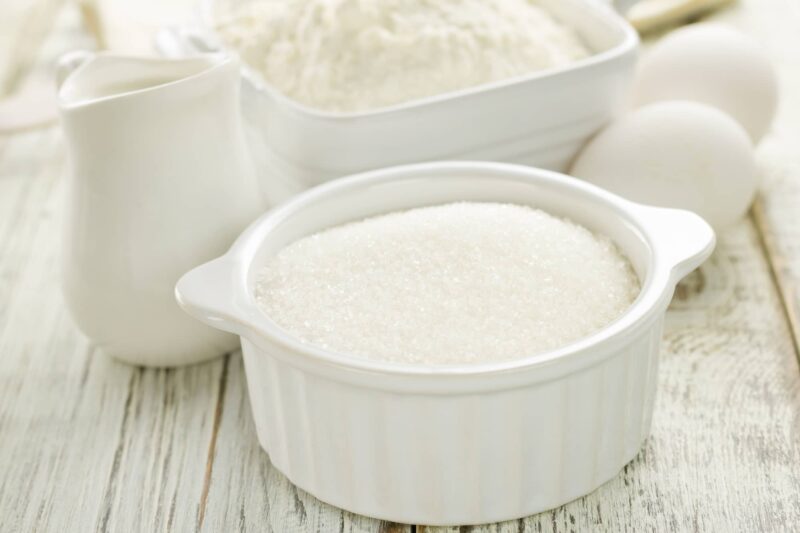However, this theory has been disproved by various scientific studies and by industry experts, such as the chemist Dario Bressanini.
Sugar, for example, has often been indicated as responsible for various pathologies, but there is no scientific evidence that directly links it to these diseases. Some studies have even shown that moderate sugar consumption has no negative effects on health.
The white flour, often accused of being harmful to our body, has no scientific evidence that connects it to the pathologies for which it is often accused. White flour is just one refined flour, which has undergone a more accurate manufacturing process than wholemeal flours. However, this does not mean that it is harmful to health: on the contrary, white flour can be consumed in moderation, as part of a balanced diet.
Milk too and its derivatives are often accused of being harmful to health, mainly due to the presence of casein, a protein found in milk. However, even in this case there is no scientific evidence linking milk to the diseases for which it is often blamed. Conversely, milk and its derivatives are important sources of essential nutrients, such as proteinil football not vitamins of group B.
Salt it is an essential nutrient that our body needs in order to function properly. However, as with many things, salt should also be consumed in moderation.
According to nutritional guidelines, the recommended salt intake is about 5 grams per day for adults. However, most people consume amounts of salt in excess of this recommendation, largely due to the high salt content found in some processed foods and many ready meals.
Too much salt in your diet can increase your risk of high blood pressure, a condition that can lead to health problems such as cardiovascular disease and stroke. This is why it is important to pay attention to the salt intake in your diet and try to limit the consumption of foods with a high salt content.
However, salt is not a “white poison” and it is not necessary to eliminate it completely from the diet. Indeed, an excessive reduction in the consumption of salt can be harmful to health, as salt is an essential nutrient and our body needs a certain amount of it to function properly.
Salt and sodium in the diet
Salt is a chemical compound formed from sodium and chlorine, with the formula NaCl. So salt contains sodium, but it is not synonymous with sodium.
Sodium is a chemical element found in many foods and beverages, both in the form of salt (NaCl) and in other forms. For example, sodium can be found in foods such as meat, fish, eggs and dairy products, but also in many processed foods, such as snack foods, ready meals and sodas.
It is important to pay attention to the sodium intake in the diet, as an excess of sodium can increase the risk of arterial hypertension and other diseases. However, sodium is also an essential nutrient and our body. That’s why it’s important to find the right balance in your sodium intake. Sodium is important for maintaining fluid balance in our body, regulating blood pressure, and for proper muscle and nerve function.
A sodium deficiency, also known as iponatriemiacan be caused by low dietary sodium intake, excessive sweating, kidney disease, or certain medications.
Sodium deficiency can cause symptoms such as weakness, tiredness, headache, nausea, vomiting, and confusion. In severe cases, hyponatremia can lead to seizures, coma and even death.
It is important to maintain a proper balance of sodium in the diet to avoid deficiencies or excesses of this nutrient. Nutritional guidelines recommend not exceeding 2,300 milligrams of sodium per day for healthy adults. However, recommendations may vary based on age, health and other individual factors. If you have concerns about the sodium intake of your diet, we recommend that you speak to your doctor or nutrition professional.
For years now white poison theory it is a hoax without scientific foundation, however like all foods it must be consumed in a moderate way, as part of a balanced diet. It is important not to give credence to theories without scientific evidence and to rely on reliable sources for information on health and nutrition.
Here are some studies:
Sugar:
- A 2015 review published in the Annual Review of Nutrition concluded that “there is no evidence that moderate consumption of added sugar is associated with an increased risk of chronic diseases such as diabetes, cardiovascular disease, and obesity” (https ://www.annualreviews.org/doi/abs/10.1146/annurev-nutr-071714-031336).
- A 2016 study published in The Lancet looked at the association between added sugar consumption and mortality from several causes. The study authors concluded that “there is no significant association between added sugar consumption and all-cause or cardiovascular disease mortality” (https://www.thelancet.com/journals/lancet/article /PIIS0140-6736(16)30175-1/fulltext).
White flour:
- A 2015 review published in The American Journal of Clinical Nutrition concluded that “there is no evidence that refined white flour is more harmful to health than whole grain flours” (https://www.ncbi.nlm. nih.gov/pmc/articles/PMC4432760/).
- A 2014 study published in The American Journal of Clinical Nutrition looked at the effect of replacing white flour with whole-grain flours on weight loss. The study authors concluded that “replacing white flour with whole-wheat flours did not lead to significantly more weight loss” (https://www.ncbi.nlm.nih.gov/pmc/articles/PMC4080680/).
The milk:
- A 2014 study published in The American Journal of Clinical Nutrition concluded that “there is no evidence that milk and its derivatives are harmful to health” (https://www.ncbi.nlm.nih.gov/ pmc/articles/PMC3963553/).
- A 2013 study published in The American Journal of Clinical Nutrition looked at the association between milk consumption and the risk of cardiovascular disease. The study authors concluded that “milk consumption was associated with a reduced risk of cardiovascular disease” (“Association of dairy intake with cardiovascular disease: an updated meta-analysis of prospective cohort studies” Authors: Tong X, Dong JY , Wu ZW, et al Journal: The American Journal of Clinical Nutrition Publication Date: 2013 https://www.ncbi.nlm.nih.gov/pmc/articles/PMC3738985/ )
Salt:
- A 2013 study published in The American Journal of Clinical Nutrition concluded that “reducing salt intake can reduce blood pressure, but excessively decreasing salt intake can be harmful” (https://www.ncbi. nlm.nih.gov/pmc/articles/PMC3738985/).
- A 2011 study published in The New England Journal of Medicine looked at the effect of reducing salt intake on blood pressure and mortality from various causes. The study authors concluded that “a reduction in salt intake in the general population can significantly reduce blood pressure and reduce the risk of death from cardiovascular disease” (https://www.nejm.org/doi/full/10.1056/ NEJMoa1007137).
Who is Dario Bressanini and what he says in his article

Dario Bressanini is an Italian chemist who, through his blog and his publications, deals with debunking myths and urban legends in the food field.
In the article, Bressanini tackles the myth of sugar as a “white poison”, denying the theories according to which the consumption of sugar is harmful to health. He explains and elaborates that sugar is simply a carbohydrate, present in many foods, such as fruits, vegetables and grains. There is no scientific evidence linking moderate sugar consumption to diseases such as diabetes, obesity or cardiovascular disease. Furthermore, he underlines that the problem is not so much the consumption of sugar itself, but the excess of calories that is often consumed by eating sweet foods. This is why it is important to consume sugar in moderation, as part of a balanced diet, and not to overdo it.
Furthermore, Bressanini explains that sugar also has some nutritional properties, such as providing energy to our body and helping to keep the blood sugar level constant.
In summary, moderate consumption of sugar is not harmful to health, and the theory of “white poison” has no scientific basis.
The source of the article
http://bressanini-lescienze.blogautore.espresso.repubblica.it/2009/06/03/miti-culinari-6-lo-zucchero-veleno-bianco/
For those who want to learn more, they can see the publications on the youtube channel
https://www.youtube.com/c/dariobressanini/videos
It may also interest you
